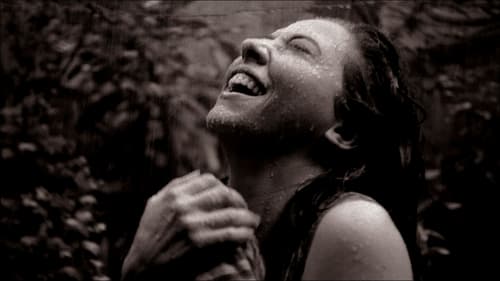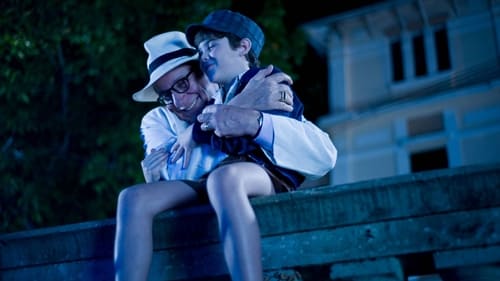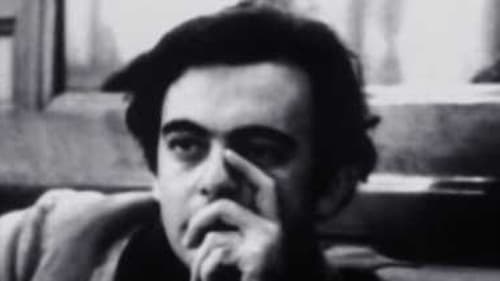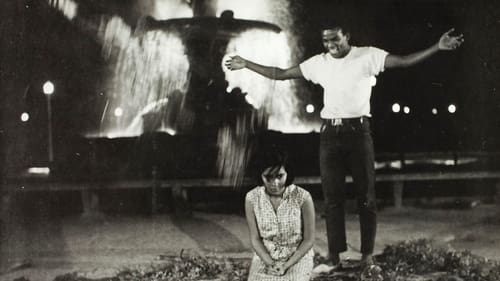Arnaldo Jabor
Nacimiento : 1940-12-12, Rio de Janeiro, Rio de Janeiro, Brazil
Muerte : 2022-02-15

Self - Filmmaker (archive footage)
Una profunda investigación, a modo de ensayo poético, sobre uno de los principales movimientos cinematográficos latinoamericanos, analizado a través del pensamiento de sus principales autores, que inventaron, a principios de los años sesenta, una nueva forma de hacer cine en Brasil, con una actitud política, siempre cercana a los problemas de la gente, que combinaba arte y revolución.

Himself
We live in a new age. We are always rushing, rushing for no reason, rushing for nothing. As though time had sped up. Everything implies speed, urgency. But ultimately, why does time seem so short? This film is about the director’s conflict about time and the lack of it in today’s world; she reflects on civilization and the future of existence.

Self

Producer
Una mirada atrás a la edad dorada, a las "épocas felices". Paulo fija su primer recuerdo en los festejos en las calles brasileras por el fin de la Segunda Guerra Mundial de la mano de sus padres. Desde ahí recorreremos los años cincuenta, y los personajes típicos de la sociedad brasilera de aquella época; la relación con su mejor amigo y con sus padres y abuelo. Una visita a un cabaret y el encuentro sorpresivo con su padre cambiará la historia de las relaciones de una manera fascinante.

Screenplay
Una mirada atrás a la edad dorada, a las "épocas felices". Paulo fija su primer recuerdo en los festejos en las calles brasileras por el fin de la Segunda Guerra Mundial de la mano de sus padres. Desde ahí recorreremos los años cincuenta, y los personajes típicos de la sociedad brasilera de aquella época; la relación con su mejor amigo y con sus padres y abuelo. Una visita a un cabaret y el encuentro sorpresivo con su padre cambiará la historia de las relaciones de una manera fascinante.

Director
Una mirada atrás a la edad dorada, a las "épocas felices". Paulo fija su primer recuerdo en los festejos en las calles brasileras por el fin de la Segunda Guerra Mundial de la mano de sus padres. Desde ahí recorreremos los años cincuenta, y los personajes típicos de la sociedad brasilera de aquella época; la relación con su mejor amigo y con sus padres y abuelo. Una visita a un cabaret y el encuentro sorpresivo con su padre cambiará la historia de las relaciones de una manera fascinante.

Self (archive footage)
Documental que recorre la vida del legendario piloto Ayrton Senna desde la temporada de su debut en 1984 hasta su prematura muerte una década después en el circuito de Imola. Cuenta una historia excepcional, dejando las técnicas habituales del documental para adoptar una visión más cinematográfica y basándose en material sorprendente e inédito extraído en gran parte de los archivos de la Fórmula 1.

Self
The life of a famous Brazilian film and television actor, including testimonials from people who knew him and worked with him, as well as excerpts from films and videos in which he acted.

Self
Documentary about the 68-generation, told through the story of the newspaper “O Sol”, one of the first vehicles of the alternative Brazilian press, produced daily for six months, in the 1960s. The newspaper spoke of culture, politics and education through satires and prominent figures in the cultural scene of the time passed through him. Archive scenes and music from the period seek to reconstitute the spirit of the 68-generation. The film has the participation of personalities such as Ziraldo, Zuenir Ventura, Arnaldo Jabor, Chico Buarque, Caetano Veloso, Carlos Heitor Cony, Fernando Gabeira, Betty Faria, Hugo Carvana, among others.

Himself

Documentary about Brazilian filmmaker Glauber Rocha, one of the most important names in the Cinema Novo, with interviews with some of his friends and colleagues.

Screenplay

Director

Producer
Young and recently separated couple meet in a modern house and start discussing their past relationship.

Writer
Young and recently separated couple meet in a modern house and start discussing their past relationship.

Director
Young and recently separated couple meet in a modern house and start discussing their past relationship.

Writer
Desgarrador encuentro entre un hombre y una mujer que desean amarse y entenderse, pero al mismo tiempo le temen poderosamente al encuentro, al intercambio, a la profundidad en la relación.

Director
Desgarrador encuentro entre un hombre y una mujer que desean amarse y entenderse, pero al mismo tiempo le temen poderosamente al encuentro, al intercambio, a la profundidad en la relación.

Producer
Middle-class family reform their apartment, and the noise, the contact with the workers and strange occurrences turn what was supposed to be a trivial matter into a trip to hell.

Writer
Middle-class family reform their apartment, and the noise, the contact with the workers and strange occurrences turn what was supposed to be a trivial matter into a trip to hell.

Director
Middle-class family reform their apartment, and the noise, the contact with the workers and strange occurrences turn what was supposed to be a trivial matter into a trip to hell.

Writer
18-year-old Glorinha finds herself on the eve of her wedding when a series of revelations plague her and her circle of family and friends. Dr. Camarinha, friend of Sabino, his father, who is a a wealthy construction entrepreneur, says Glorinha's fiancé is homosexual. Glorinha, for his part, reveals to him that she had been a lover of his dead son, Antônioa year ago. Sabino reveals to Noemia, his secretary with whom he ends up having a sexual relationship, who had experienced a homosexual practice as a child and calls her by the name of his daughter. Noemia, in turn, Xavier's mistress, who lives with a leprous woman who has long since cared for, reveals to him that she no longer intends to be his mistress. Glorinha goes with her father to a deserted beach, where she makes insinuations that she loves him and, when kissed by her father, runs desperately and tells her mother that her father had tried to rape her. Xavier, in turn, assassinates Noemia in the office.

Director
18-year-old Glorinha finds herself on the eve of her wedding when a series of revelations plague her and her circle of family and friends. Dr. Camarinha, friend of Sabino, his father, who is a a wealthy construction entrepreneur, says Glorinha's fiancé is homosexual. Glorinha, for his part, reveals to him that she had been a lover of his dead son, Antônioa year ago. Sabino reveals to Noemia, his secretary with whom he ends up having a sexual relationship, who had experienced a homosexual practice as a child and calls her by the name of his daughter. Noemia, in turn, Xavier's mistress, who lives with a leprous woman who has long since cared for, reveals to him that she no longer intends to be his mistress. Glorinha goes with her father to a deserted beach, where she makes insinuations that she loves him and, when kissed by her father, runs desperately and tells her mother that her father had tried to rape her. Xavier, in turn, assassinates Noemia in the office.

Narrador

Producer
Un joven rico y mimado se encuentra con una prostituta y confunde la naturaleza de sus sentimiendos por ella, sin poder decidir entre la atracción y la repulsión.

Writer
Un joven rico y mimado se encuentra con una prostituta y confunde la naturaleza de sus sentimiendos por ella, sin poder decidir entre la atracción y la repulsión.

Director
Un joven rico y mimado se encuentra con una prostituta y confunde la naturaleza de sus sentimiendos por ella, sin poder decidir entre la atracción y la repulsión.

The importance of the Cannes Film Festival in world terms and what it represented for Brazil in 1971. For Brazilian cinema, Cannes 71 represented the transition from film to industrialized production. It is the meeting of producers, technicians, critics , celebrities in general, offering opportunities for greater knowledge and renewal of values

Editor
This Brazilian film is set during the period of its initial colonial discovery and settlement. The title refers to a word the native peoples used for the coastal lands: "pindorama," or "place of the small trees." A ponderous and grandiose film, it was roundly booed when it was aired at the 1971 Cannes Film Festival.

Producer
This Brazilian film is set during the period of its initial colonial discovery and settlement. The title refers to a word the native peoples used for the coastal lands: "pindorama," or "place of the small trees." A ponderous and grandiose film, it was roundly booed when it was aired at the 1971 Cannes Film Festival.

Writer
This Brazilian film is set during the period of its initial colonial discovery and settlement. The title refers to a word the native peoples used for the coastal lands: "pindorama," or "place of the small trees." A ponderous and grandiose film, it was roundly booed when it was aired at the 1971 Cannes Film Festival.

Director
This Brazilian film is set during the period of its initial colonial discovery and settlement. The title refers to a word the native peoples used for the coastal lands: "pindorama," or "place of the small trees." A ponderous and grandiose film, it was roundly booed when it was aired at the 1971 Cannes Film Festival.

Intérprete
Chronicles the life of a 17 year-old girl living in the upper-class Rio de Janeiro neighbourhood of Ipanema. Márcia lives a life of parties and spend her days among bohemians, musicians and intellectuals. While seeming happy in the outside, she's extremely anguished inside. Based on the famous song by Antonio Carlos Jobim and Vinicius de Moraes.

Editor
Documentary about middle-class people in Rio de Janeiro, in the 1960s, when Brazil was going through a hard period in its history, with the military coup and the following dictatorship. Interviews with people in the street disclose their fears, aspirations and political alienation.

Producer
Documentary about middle-class people in Rio de Janeiro, in the 1960s, when Brazil was going through a hard period in its history, with the military coup and the following dictatorship. Interviews with people in the street disclose their fears, aspirations and political alienation.

Screenplay
Documentary about middle-class people in Rio de Janeiro, in the 1960s, when Brazil was going through a hard period in its history, with the military coup and the following dictatorship. Interviews with people in the street disclose their fears, aspirations and political alienation.

Himself
Originally produced for German TV, Improvised and Purposeful is a firsthand look at the "Cinema Novo" movement (otherwise known as the 'Brazilian New Wave'). Director Joaquim Pedro de Andrade focuses on six Cinema Novo filmmakers working in Rio in 1967.

Director
Documentary about middle-class people in Rio de Janeiro, in the 1960s, when Brazil was going through a hard period in its history, with the military coup and the following dictatorship. Interviews with people in the street disclose their fears, aspirations and political alienation.

In search of a better life, Luzia leaves the Northeast of Brazil and goes to Rio de Janeiro, looking for her fiance who went first to pave their way. Alone in the Marvelous City, she is forced to accept the friendship and protection of Calunga and, later, the company of Inácio.

Narrador

Producer

Narrator (voice)

Writer

Director

Co-Writer
Statistics, interviews and historical information on illiteracy and inequality in land distribution in Brazil's countryside.

Executive Producer
Statistics, interviews and historical information on illiteracy and inequality in land distribution in Brazil's countryside.

Sound Recordist
Statistics, interviews and historical information on illiteracy and inequality in land distribution in Brazil's countryside.

Sound Director
A comprehensive view of the situation of different ethnic groups in Brazil. In the testimonies gathered in the streets and neighborhoods of various capitals, black, white, mulatto, Portuguese, Italian and Japanese express their opinion and describe personal experiences involving relationship, racism, miscegenation and cultural exchange.

Narrador





































